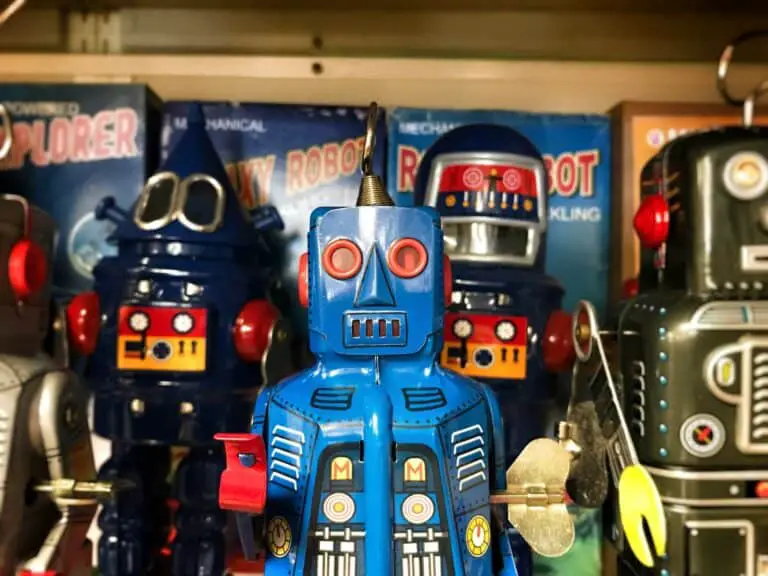In recent years, Artificial Intelligence (AI) has made significant strides in transforming many aspects of our daily lives. From personalised recommendations to advanced image recognition and process automation, AI has the potential to revolutionise the way we plan trips to flea markets and shop for antiques online.
In this article, we will explore the exciting ways in which Artificial Intelligence can assist us in these endeavours, taking over tedious tasks such as logistics to make our experiences more efficient, enjoyable and rewarding, and the impact it could have on the traditional flea market shopping experience.
1. Antiquing Trip Planning with Artificial Intelligence
Planning a visit to a flea market or an antique tour can be an overwhelming exercise, especially given the vast array of options available. In the near future, AI could simplify this process by providing personalised recommendations, keeping us informed of upcoming events, and optimising routes.
Personalised Recommendations
AI algorithms will be able to analyse our preferences, past shopping history and other relevant data to provide tailored recommendations for flea markets that match our interests. By understanding our unique tastes and preferences, Artificial Intelligence could suggest flea markets known for specific antique categories, such as vintage clothing, antique furniture or rare collectibles. With these tailored recommendations, we could discover new markets and explore hidden gems that truly cater to our individual tastes.
Event Notifications
Keeping up with upcoming flea markets can be a challenge, especially if they are sporadic or in different regions. AI could keep us informed of upcoming events in our area by aggregating data from multiple sources, such as Fleamapket’s calendar of upcoming antique shows. By providing timely event notifications, Artificial Intelligence would ensure that we don’t miss out on interesting opportunities to explore new markets, meet dealers and discover unique antique treasures.
Supplier and Product Information
AI can collect and analyse data about suppliers and their offerings, providing us with valuable insights. By understanding seller profiles, product quality and pricing trends, AI could help us make more informed decisions. Whether we are looking for a specific antique or seeking expert advice, AI could provide detailed information about sellers’ specialities, reputations and customer reviews. With the help of Artificial Intelligence, we will be able to approach flea markets with even more confidence, knowing which dealers are more likely to have the types of products we are looking for.
Location and Route Optimisation
Navigating traffic and unfamiliar routes to get to a flea market can be a daunting task. However, AI-powered navigation systems can alleviate these challenges. By taking into account real-time data such as traffic conditions, road closures and alternative routes, AI can already provide us with the most efficient route to our chosen destination. This not only saves time, but also reduces stress, allowing us to focus more on the anticipation of our flea market adventure.
Customs, Shipping, Taxes, and Insurance: How AI Can Simplify and Streamline the Logistical Challenges Associated With Antique Shopping and Travel
Artificial Intelligence could play a crucial role in the future in simplifying and streamlining the logistical challenges associated with antique shopping and travel. Tasks such as dealing with customs, shipping/freight/transport, tax declarations and insurance/cover can often be complex and time-consuming. However, AI-powered systems will be able to automate and handle these processes on an individual level, offering convenience and peace of mind when it comes to shipping antiques abroad.
For example, AI algorithms will be able to navigate the intricacies of customs regulations, ensuring compliance and smooth transactions when transporting antiques across borders. Artificial Intelligence could also provide real-time shipping and freight solutions, comparing options and optimising routes to ensure safe and efficient transport. In addition, AI could assist with tax filing, accurately calculating and reporting applicable taxes based on the type and value of antiques purchased. Finally, AI could provide guidance and recommendations on insurance coverage specifically tailored to the unique needs of antiquities, protecting against potential risks and damage.
By removing the burden of these tedious tasks, AI will enable antique buyers and travel enthusiasts to focus on the joys of exploring and acquiring treasured pieces of history with confidence and ease.
2. Online Antique Shopping with Artificial Intelligence
The world of online antique shopping offers a wealth of choice, but finding the perfect item can be a daunting task. Fortunately, AI could enhance the online shopping experience by improving search capabilities, providing visual recognition, enabling price comparison and detecting potential fraud.
Intelligent Search and Filtering
AI algorithms excel at understanding our preferences and refining search results based on our criteria. When searching for antiques online, AI will be able to enhance our shopping experience by suggesting relevant keywords, categories or filters that match our interests. For example, if we are interested in vintage cameras, AI could make suggestions such as ‘rare film cameras’ or ‘classic camera brands’. By refining search results based on price range, condition, era, or other relevant factors, AI will enable us to find exactly what we are looking for, quickly and efficiently.
Visual Recognition
One of the challenges of online antiques shopping is assessing the authenticity and condition of items based on images alone. AI-powered visual recognition systems can alleviate this concern. By analysing images and accurately identifying antique items, Artificial Intelligence can already provide valuable information about similar products, their origins and estimated values. Using tools like Google Lens, for example, we can simply take a photo or upload an image of an item we are interested in and the AI system can provide insights and recommendations based on its analysis. This gives us more information to make informed decisions and avoid buying fake or misrepresented items.
Price Comparison and Negotiation
With countless online marketplaces and auction platforms, comparing prices for antique items can be time-consuming. AI can gather data from multiple sources, compare prices for similar items and provide us with comprehensive insights. By analysing historical sales data and current listings, AI can help us determine fair market values for antique items. Artificial Intelligence can also help negotiate prices on our behalf or suggest reasonable offers to ensure we get the best deal possible.
Fraud Detection
Online marketplaces are not immune to fraud or counterfeit items, so it is important to be cautious when shopping for antiques. AI can be a valuable tool in identifying potential fraud by analysing seller reputation, item descriptions and other relevant data. By flagging suspicious listings and alerting us to potential risks, AI protects us from fraudulent purchases and ensures a safer shopping experience. With the help of Artificial Intelligence, we can shop online with greater confidence, knowing that we are dealing with reputable sellers and genuine products.
3. Virtual Showrooms and Augmented Reality
As technology continues to advance, virtual showrooms and augmented reality (AR) experiences will become more prevalent in the world of antiques. These innovations, powered by AI, could allow us to virtually explore and evaluate antique items, revolutionising the way we shop for antiques in the future.
Virtual Showrooms
AI-powered virtual reality (VR) or augmented reality (AR) platforms will be able to create immersive virtual flea market experiences. We could explore different stalls, interact with sellers and examine items virtually. These virtual showrooms will be able to partially replicate the atmosphere of a physical flea market, allowing us to browse through antique treasures without leaving the comfort of our homes. Virtual showrooms will allow us to assess the authenticity, condition and attractiveness of items before making a purchase, increasing our confidence and satisfaction.
Home Visualisation
AR in particular offers exciting possibilities for antique shopping. Artificial Intelligence can already help us visualise how antique items might look in our homes. Using augmented reality technology, we can virtually place furniture, artwork or other objects in our living spaces and see how they fit with our existing decor. This technology allows us to make more informed decisions, ensuring that the antique items we purchase are in harmony with our surroundings.
4. The Limits of Artificial Intelligence and the Value of Flea Markets
While AI offers many benefits for travel planning and online antique shopping, it also has limitations that highlight the enduring value of flea markets. AI algorithms rely on data and patterns, which can sometimes lead to predictable recommendations and search results. This can limit the serendipitous and spontaneous nature of discovering unique items that are often found at flea markets.
Flea markets have a lively atmosphere that allows us to interact with real people, including passionate collectors, experienced dealers and fellow enthusiasts. By engaging in face-to-face conversations, we can gain first-hand knowledge, hear fascinating stories behind the items and build connections with the antiques community. Flea markets also offer the pleasure of haggling and negotiating prices in person, which can be an exciting experience. It allows for a personal connection between buyer and seller, fostering a sense of camaraderie and the satisfaction of a mutually beneficial deal. Flea markets also offer the opportunity to enjoy a day outdoors, basking in the vibrant atmosphere and immersing yourself in the cultural heritage of a particular location.
As we wander through stalls full of treasures, we may come across unexpected gems that AI algorithms might not have predicted. The sheer variety and abundance of items available at flea markets make them an unparalleled experience, offering a sense of adventure and discovery. Ultimately, while Artificial Intelligence will make antique shopping more convenient and efficient, flea markets will continue to captivate us with their unique charm, human interaction, bargaining opportunities and the sheer joy of stumbling upon extraordinary finds.
The Bottom Line
The future of antiques shopping is bright with the integration of Artificial Intelligence. From personalised recommendations and optimised travel planning to enhanced online exploration through intelligent search, visual recognition and fraud detection, AI is revolutionising the way we discover, evaluate and acquire antique treasures. But while AI offers significant benefits, flea markets retain their irreplaceable value.
Flea markets offer the opportunity to interact with real people, haggle face-to-face and enjoy a day outdoors. They offer a vibrant atmosphere where we can stumble upon unexpected gems and engage in face-to-face conversations with passionate collectors and sellers. The thrill of haggling over prices and the serendipity of discovering unique items make flea markets a unique experience.
As AI continues to advance, our experiences with both flea markets and online antiques shopping will be enriched, providing us with more efficient and rewarding ways to discover and cherish timeless pieces of history.



